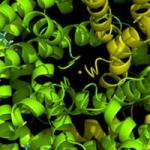
Antonina Roll-Mecak, Ph.D.
Senior Investigator
Cell Biology and Biophysics Section
NINDS
Research Topics
Cells depend on the asymmetric distribution of their components for homeostasis, differentiation and movement. In no other cell type is this requirement more critical than in the neuron where complex structures are generated during process growth and elaboration and cargo is transported over distances several thousand times the cell body diameter. Microtubules act both as dynamic structural elements and as tracks for intracellular transport. Microtubules are mosaic polymers containing multiple tubulin isoforms functionalized with abundant posttranslational modifications that are asymmetrically distributed in neurons. An increasing body of evidence supports the hypothesis that the combinatorial information expressed through tubulin genetic and chemical diversity controls microtubule dynamics, mechanics and interactions with microtubule effectors and thus constitutes a 'tubulin code'. Disruption of tubulin modification levels and patterns leads to cancers, neuropathologies and defective axonal regeneration. Although discovered over thirty years ago, an understanding of the roles of the genetic and chemical complexity of microtubules has remained elusive. My laboratory aims to understand (i) the biochemical mechanisms of tubulin modification enzymes and how the complex patterns of tubulin posttranslational modifications observed in cells are generated by these enzyme families (ii) the effects of tubulin posttranslational modifications on the basic properties of the microtubule polymer: its mechanical properties and dynamics and (iii) the effects of tubulin modifications on the recruitment and function of cellular effectors. We take a multifaceted experimental approach to answer these questions integrating structural biology and classic enzymology with single molecule biophysics, live cell imaging and modeling
Biography
Selected Publications
- Chen J, Zehr EA, Gruschus JM, Szyk A, Liu Y, Tanner ME, Tjandra N, Roll-Mecak A. Tubulin code eraser CCP5 binds branch glutamates by substrate deformation. Nature. 2024;631(8022):905-912.
- Chen J, Kholina E, Szyk A, Fedorov VA, Kovalenko I, Gudimchuk N, Roll-Mecak A. α-tubulin tail modifications regulate microtubule stability through selective effector recruitment, not changes in intrinsic polymer dynamics. Dev Cell. 2021;56(14):2016-2028.e4.
- Vemu A, Szczesna E, Zehr EA, Spector JO, Grigorieff N, Deaconescu AM, Roll-Mecak A. Severing enzymes amplify microtubule arrays through lattice GTP-tubulin incorporation. Science. 2018;361(6404).
- Vemu A, Atherton J, Spector JO, Moores CA, Roll-Mecak A. Tubulin isoform composition tunes microtubule dynamics. Mol Biol Cell. 2017;28(25):3564-3572.
- Mahalingan KK, Grotjahn DA, Li Y, Lander GC, Zehr EA, Roll-Mecak A. Structural basis for α-tubulin-specific and modification state-dependent glutamylation. Nat Chem Biol. 2024;20(11):1493-1504.
Related Scientific Focus Areas




Biomedical Engineering and Biophysics
View additional Principal Investigators in Biomedical Engineering and Biophysics

This page was last updated on Friday, September 5, 2025